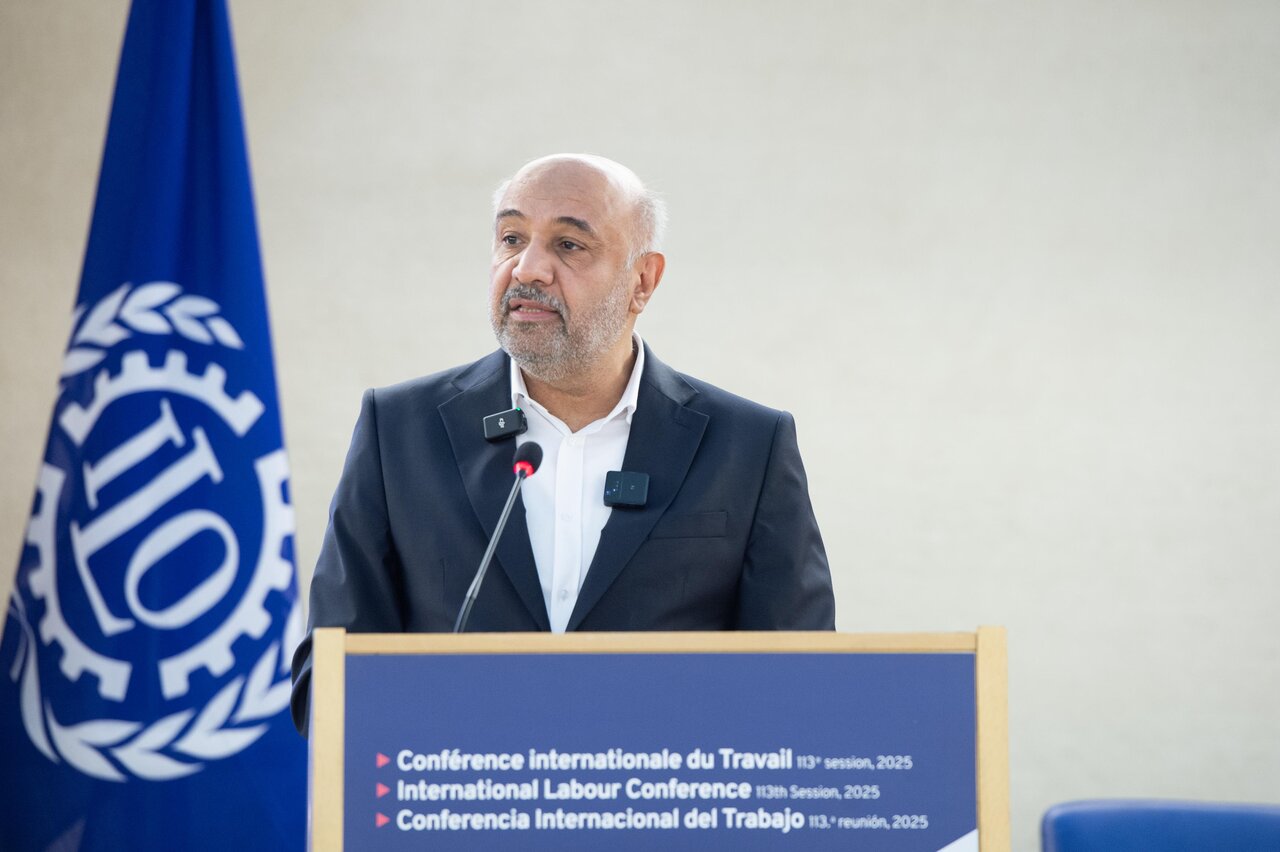Iranian minister highlights the miseries of laborers in Gaza in Geneva

GENEVA - Iranian Labor Minister Ahmad Meidari has highlighted the sufferings and agonies of workers in the Gaza Strip at the hands of the Israeli miliary.
“Thousands of workers have been killed at their workplaces, including at least 280 UN staff, 200 journalists and more than 1,000 healthcare workers,” Meidari told the International Labour Organization (ILO) conference held in Geneva.
Following is the text of his speech:
Distinguished Chairperson, esteemed delegates, ladies and gentlemen, honorable members of the International Labour Organization, respected colleagues,
I am deeply honored to address this distinguished assembly on behalf of the Iranians and to contribute to the ongoing dialogue on how we can collectively overcome the challenges facing workers in the 21st century.
Let me start by a look at the reasons behind the establishment of this organization and its sacred objectives.
We know that the International Labour Organization was founded in 1919 after World War I, and its foundational declaration was drafted in 1949 in Philadelphia. The founders of this organization learned significant lessons from both World War I and World War II, which are explicitly stated in the Philadelphia Declaration. At the beginning of this declaration, we read:
Believing that experience has fully demonstrated the truth of the statement in the Constitution of the International Labour Organization that lasting peace can be established only if it is based on social Justice.
The term "experience" in the above phrase refers to war. The great wars of the twentieth century began with oppression against minorities and weaker nations.
World War I was a war among global powers over the division of the world. For two centuries, these powers formed alliances to divide and colonize Asia, Africa, and other parts of the world, plundering together or, through their silence, allowing great civilizations like China and India to decline and be colonized.
However, this shameful and sinister alliance backfired, turning the twentieth century into humanity's bloodiest century.
Today, once again, the powers have remained silent, allowing the most disgraceful atrocities against the children and people of Gaza to occur. I am deeply grateful to the Director-General of the International Labour Organization for, despite all limitations, addressing some of these shameful atrocities in Gaza in the report “The Situation of Workers of the Occupied Arab Territories”. I would like to read excerpts from this report.
By late March 2025, more than 50,000 Palestinians had been killed; some 11,000 were missing and more than 110,000 injured.
Thousands of workers have been killed at their workplaces, including at least 280 UN staff, 200 journalists and more than 1,000 healthcare workers. More than 80 percent of commercial facilities have been damaged and almost all agricultural assets destroyed.
Honorable Director-General, you have remained faithful to the pledge you made to workers, employers, and humanity, acting in the tradition of the founders of this organization.
Addressing the injustice against Gaza is not a marginal issue but the central focus of this meeting.
I reiterate: the great wars between global powers begin with oppression against minorities and poorer nations. If Jews faced injustice before World War I, today it is Muslims who are being oppressed. As we see, the war began with Gaza, but its repercussions have spread to several countries.
For this reason, this conference is not merely about economic growth and labor; it is a conference for forging a global alliance for justice. We, the labor ministers, along with our partners in workers’ and employers’ organizations, know well that global justice is the foundation of peace, and peace is the foundation of prosperity.
If we, those gathered here, fulfill our heavy responsibilities, peace will be established and sustained in the world.
Let us not remain silent in the face of any injustice, no matter how small.
Silence, as the 18th-century philosopher Edmund Burke said,
The only thing necessary for the triumph of evil is for good men to do nothing.”
Nobel laureate Elie Wiesel emphasized the dangers of silence:
“The opposite of love is not hate, it's indifference. The opposite of beauty is not ugliness, it's indifference. The opposite of faith is not heresy, it's indifference. And the opposite of life is not death, but indifference between life and death.”
The great 13th-century Iranian poet, Saadi, says:
"The foundation of injustice in the world was, at first, but a small thing;
Yet each who came added to it, until it reached such heights."
«وَاتَّقُوا فِتْنَةً لَا تُصِيبَنَّ الَّذِينَ ظَلَمُوا مِنْكُمْ خَاصَّةً…»
از فتنهای بپرهیزید که تنها دامن ظالمان را نمیگیرد، بلکه همه را در بر میگیرد.
And fear a trial which will not smite those who do wrong among you alone
Leave a Comment